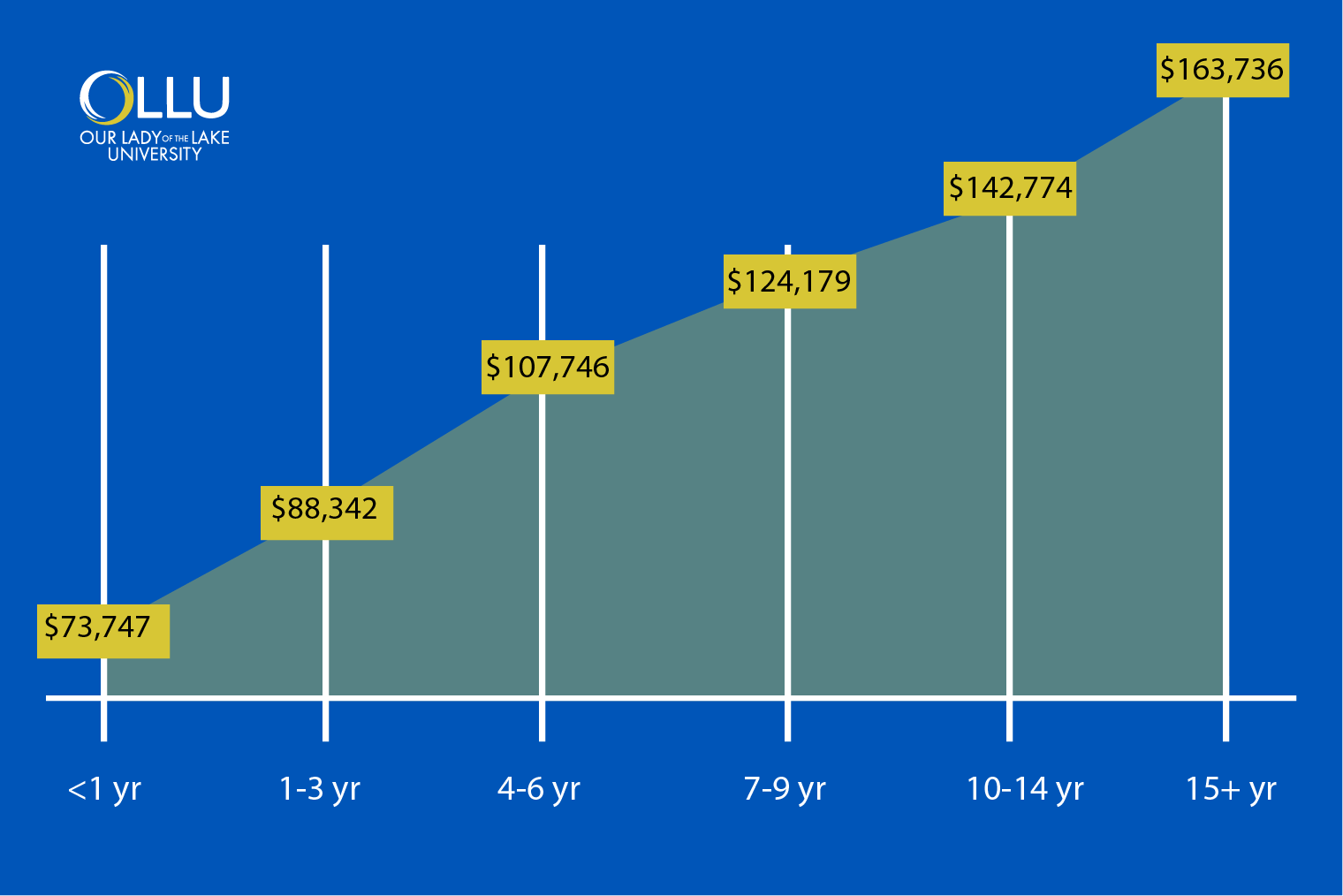Master’s in Organizational Leadership: The Salary Landscape in 2023
Oct 13, 2023

Leadership is vital in today’s fast-paced, competitive work environment, where leaders can significantly influence team performance and innovation. Given the high stakes, it’s no wonder leadership roles often come with lucrative compensation. If you’re considering a leadership career, understanding the salary potential of a master’s in organizational leadership is essential. Keep reading to discover what awaits you.
How Much Can You Make With a Master’s in Organizational Leadership?
With a Master of Science in Organizational Leadership, you’re well-positioned for a range of high-paying roles. In the U.S., the estimated average annual salary for this field is $117,389. However, actual earnings can differ considerably depending on your specific job. Let’s examine potential salaries for roles you could land with this degree.
Management analyst
As a management analyst, you would be responsible for assessing and improving organizational processes, utilizing data analysis and research to enhance efficiency. In the United States, management analysts earn an estimated total pay of $80,314 per year, with salaries ranging from $54,000 to $121,000 annually.
Insurance underwriter
When working as an insurance underwriter, your role involves evaluating insurance applications and determining coverage terms and premiums. In the U.S., as an insurance underwriter, you would earn an estimated total pay of $68,130 per year, with salaries ranging from $43,000 to $108,000 annually.
Project coordinator
In your role as a project coordinator, you’ll take the lead in planning, organizing and supervising various projects for your organization or clients. According to available data, project coordinators earn an estimated total pay of $58,963 per year, with salaries ranging from $42,000 to $84,000 annually.
Top executive
As a top executive, whether in a senior executive or chief executive officer (CEO) role, you’ll be at the wheel of critical decision-making processes within your organization. For senior executives, the estimated total pay is $185,805 per year, with salaries ranging from $139,000 to $254,000 annually. Meanwhile, for CEOs, the estimated total pay rises to $396,095 per year, with salaries spanning from $230,000 to $725,000 annually.
Industrial production manager
As an industrial production manager, you’ll be tasked with overseeing the production processes within industrial settings. The estimated total pay for this role is $70,653 per year, with salaries varying from $44,000 to $115,000 annually.
Medical and health services manager
If you choose to pursue a role as medical and health services manager, you’ll be in charge of overseeing healthcare facilities and ensuring the smooth delivery of medical services. In the United States, the estimated total pay for this position is $91,292 per year, with salaries spanning from $57,000 to $147,000 annually.
Public relations and fundraising manager
When working as a public relations/fundraising manager, you’ll be at the forefront of managing public image and driving fundraising efforts for your organization. According to recent data, the estimated total pay for this role is $48,232 per year, with salaries spanning from $31,000 to $75,000 annually.
Training and development manager
Pursuing a career as a training and development manager means that you’ll take on a vital role in enhancing the skills and knowledge of employees within your organization. The estimated total pay for this position is $83,962 per year, with salaries ranging from $68,000 to $105,000 annually.
Human resources manager
Another role you can pursue is that of human resource manager, overseeing the personnel management functions within the organization. Data shows that in the U.S. the estimated total pay for this position is $87,686 per year, with salaries ranging from $57,000 to $136,000 annually.
Sales manager
In the role of a sales manager, you’ll hold a key position in driving revenue and overseeing sales operations within your organization. The estimated total pay for this role is $120,436 per year, with salaries ranging from $91,000 to $163,000 annually.
School principal
As a school principal, you’ll be responsible for overseeing the educational operations and administration within a school. In the U.S., the estimated total pay for this position is $121,347 per year, with salaries ranging from $95,000 to $156,000 annually.
Education administrator
Lastly, as an education administrator, you will be tasked with managing the administrative functions of an educational institution. According to recent data, the estimated total pay for this position is $56,998 per year, with salaries ranging from $45,000 to $72,000 annually.
Comparing Master’s With Bachelor’s Degree Earnings
When considering potential earnings for graduates with a master’s in organizational leadership, it becomes clear that they generally outperform those with just a bachelor’s degree. Recent data from the Bureau of Labor Statistics underscores this disparity. According to their findings, workers aged 25 and over who hold a bachelor’s degree as their highest level of education earn an average weekly salary of $1,432. On the other hand, those with a master’s degree enjoy a higher weekly average salary of $1,661.
This substantial gap serves to highlight the notable financial benefits often associated with pursuing an advanced degree. It also reflects the premium that employers place on the specialized skills, enhanced expertise and greater depth of knowledge that come with a master’s-level education.
Factors Influencing Salary
In addition to the educational level, some other factors that can influence the salary include:
Experience

Professionals with more years of experience tend to command higher compensation due to their accumulated expertise and demonstrated proficiency in their respective fields. For example, in the area of organizational leadership, the average salaries are:
- $73,747 for up to one year of experience
- $88,342 for one to three years of experience
- $107,746 for four to six years of experience
- $124,179 for seven to nine years of experience
- $142,774 for ten to fourteen years of experience
- $163,736 for 15 or more years of experience
Location
Salaries are often influenced by the cost of living in a particular area. According to data, a significant 71% of employers with a presence in multiple locations implement regional pay differentials. This means they adjust pay rates based on the specific geographic area. These adjustments take into account variations in the cost of labor and cost of living, ensuring that employees are compensated fairly in relation to their local economic conditions.
Certification
Obtaining relevant certifications can significantly impact your earning potential. Studies have shown that adding certificates to your resume can lead to substantial salary increases, ranging from 5% to 20%. The extent of the increase depends on factors such as the industry and the demand for the specific certification.
Career Advancement Opportunities
After obtaining a foundational understanding of leadership through an undergraduate degree, you’ll be well-positioned for entry-level roles in organizational leadership across various industries. However, it’s important to note that this field values not just experience and expertise but also places a strong emphasis on continuous learning and professional development.
As you advance your education with higher-level degrees, such as an MBA or a Minor In Organizational Leadership, and accumulate practical experience, you’ll become eligible for more senior roles within your organization.
The acquisition of key skills in areas like strategic planning, team management and decision-making will further bolster your candidacy for top executive positions, including roles like chief operating officer or chief executive officer.
The Demand for Organizational Leadership
Based on recent information from the Bureau of Labor Statistics, the future of organizational leadership roles as part of the management field looks very favorable. Forecasts suggest that management is expected to see a growth rate exceeding the average for all professions from 2022 to 2032, with around 1.1 million job openings each year during this period, indicating a substantial need for proficient individuals in these roles.
Other Benefits of a Master’s Degree in Organizational Leadership
Pursuing a master’s degree offers more than just the promise of higher pay and career growth. It also grants access to a diverse network of professionals in the industry, offering valuable chances for mentorship, cooperation and potential job prospects.
Moreover, a master’s program in organizational leadership is beneficial due to the specialized knowledge it provides. The curriculum covers complex topics that ensure a greater understanding of intricate leadership challenges. Armed with this in-depth knowledge, you can confidently navigate complex organizational landscapes and contribute to the success of the organization you work for.
What Makes Someone a Good Fit for a Master’s in Organizational Leadership?
The Master’s in Organizational Leadership program is a natural choice for students with an innate inclination toward leadership. However, it’s important to note that this isn’t the sole prerequisite. Many critical skills necessary for success in this field can be cultivated and honed over time.
Therefore, anyone with a genuine passion for driving organizational improvement and a determined resolve to instigate positive change within the workplace can be fit for such a program. The curriculum is designed to foster and refine these attributes, ultimately equipping you with all the tools you need to excel as a leader in professional environments.
The Bottom Line
Beyond the intrinsic rewards of guiding teams and driving organizational success, the field of leadership offers excellent salaries and opportunities for growth. So, if you’re eager to embark on this rewarding journey, consider our school as your partner in this endeavor.
Is a master’s in organizational leadership worth it?
A master’s in organizational leadership is worth it if you want to pursue leadership roles, as it equips you with specialized skills and knowledge tailored for effective leadership in diverse organizational settings.
What is the difference between an MBA and organizational leadership?
An MBA focuses on a broader aspect, encompassing finance, marketing and operations, whereas organizational leadership programs are more specialized, focusing specifically on leadership.
How hard is a master’s in organizational leadership?
The difficulty of such a program depends on your strengths and prior experience. Still, you can navigate the program successfully with dedication, effective time management and a genuine interest in leadership.
How long is a master’s in organizational leadership?
Such programs typically take about two years to complete. However, the duration may vary based on the program format you pursue.
How much does a degree in organizational leadership cost?
The cost of a degree in organizational leadership varies depending on factors like the institution, program format and location.